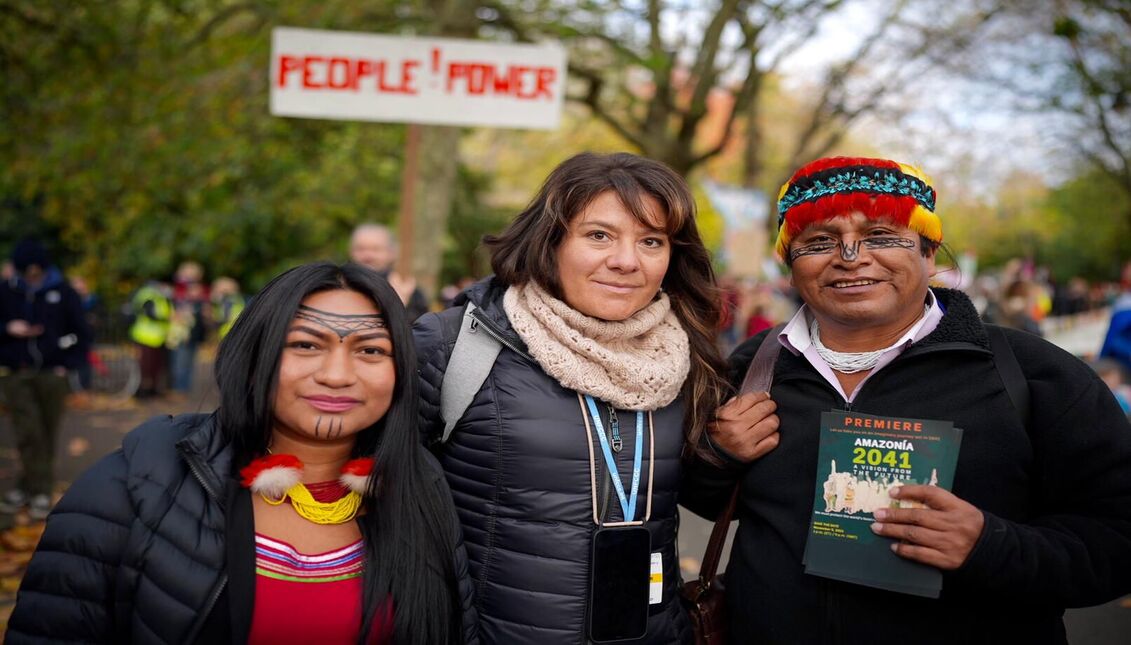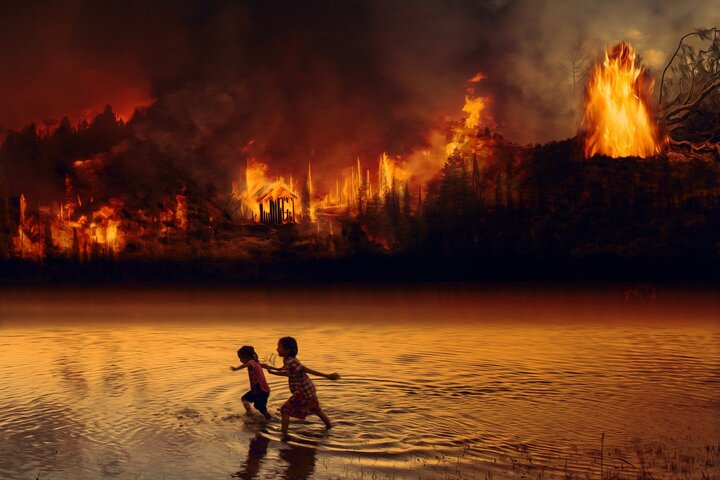
COP26: The call to the youth of Indigenous communities for the planet
In Glasgow, one of the most important Indigenous leaders of the Amazon basin, invited people from all over the world to change their minds to save the planet.
Domingo Peas Nampichikai is one of the official spokespeople for the Indigenous groups of the Ecuadorian and Peruvian Amazon that traveled to Glasgow to make the voice of the communities of the “Sacred Basins” heard, and are affected daily by the destruction of the jungle by mining, oil and logging operations in ecosystems that should remain intact.
The “Sacred Basins” have an area of 35 million hectares, a vast place in which 30 Indigenous tribes converge and is inhabited by more than 600,000 people. It is all these groups that will benefit if the resources reach their communities because the money will not be lost along the way and can be invested in education and in the development of their sustainable projects. In the end, if these communities do well, the whole world benefits.
Seeking to propose concrete solutions for the protection of the Amazon, Domingo presented a road map that seeks to move from an extraction-type economic model — like the current one — to one that favors the protection of this ecosystem through new economic development activities, such as community tourism and sustainable entrepreneurship. Likewise, the call is also for financial entities to forgive unpopular foreign debt, with payments that come from the industries with practices that devastate the jungle and economically benefit the nations seeking to protect nature.
The spokesperson points out that the money governments allocate for environmental protection is spent on bureaucracy and design plans that never come to fruition. In the process, these resources never reach the communities that live in these spaces and because they are the main guardians of the jungle, should be the first beneficiaries and overseers of the initiatives.
"I do not have an official voice with the government, but I make contacts with the objective of being a bridge between the indigenous world and the developed countries," Domingo highlighted.
He's optimistic that many people come to share their message and ask how they can help, and emphasized that unity and friendship must be woven in the world.One of the aspects of the current environmental policies that these communities seek to transform is to go from 30% protection to the “Sacred Basins” by 2030 to a figure of at least 80% by 2025. The plan, according to the review of various experts around the world, would be feasible if the political will existed.

Domingo also made a relevant criticism of the large single-product crops that promote deforestation. To be specific, it is the avocado in the sights of environmentalists and, recently, also important chefs around the world, who, according to a report presented over the weekend by The Guardian, are promoting a change in their kitchens that would considerably limit the presence of the fruit because it is produced from monocultures that cause severe environmental damage.
According to Carbon Footprint Ltd., avocados present in Central and South America can each require up to 320 liters of water, while a standard package with two small units produce a carbon footprint of almost 850 grams. Likewise, the high use of agrochemical inputs degrades the fertility of the soil, which makes food of this type unsustainable.
RELATED CONTENT
The Guardian also reported that it can be seen how, due to the high value these crops have for the sustainability of the planet, renowned chefs and representatives of the food industry are becoming more aware of the processes of intensive agriculture and of how to standardize these techniques that are accelerating global warming and the destruction of forests.
When asked about the pessimism and continuous call for protest by environmental leaders in the framework of the Glasgow summit and the lack of real attention to the concrete requests of communities like the ones he represents, Domingo's response was clear: "We should not expect that the politicians and representatives of this summit will solve the serious environmental problems caused by the current economic system.”
On the contrary, he invites each person to be agents of change, so they can start to generate real actions to protect the planet, especially with a change that prioritizes the human aspect and gives the corresponding value to treasures such as the Amazon.
Domingo also highlighted that "as long as there is no individual transition" it will be very difficult for real changes to take place in the policies and environmental behavior of each country. For him, it is necessary to assume a spiritual stance that breaks the chain of consumerism and allows them to become aware that life is better for everyone if we understand more with nature. If we respect it and leave behind the practices that have led us to consume irrationally, the resources provided by our fertile and beautiful planet.
"Youth is a key point," said Domingo, explaining that it is the youth, men and women, who must lead this fight, since they will be in charge of collecting later what is sown today with these actions. He invites them to continue protesting and demanding what their leaders are not capable of doing — promoting a different attitude towards the environment and cutting the vicious link between industries that go opposite the rational and sustainable use of our natural resources.
"Everything we have is in our hands," said the spokesman.
We have the power of change and it is our actions that should guide this tough war against global warming and the end of life on the planet.











LEAVE A COMMENT:
Join the discussion! Leave a comment.